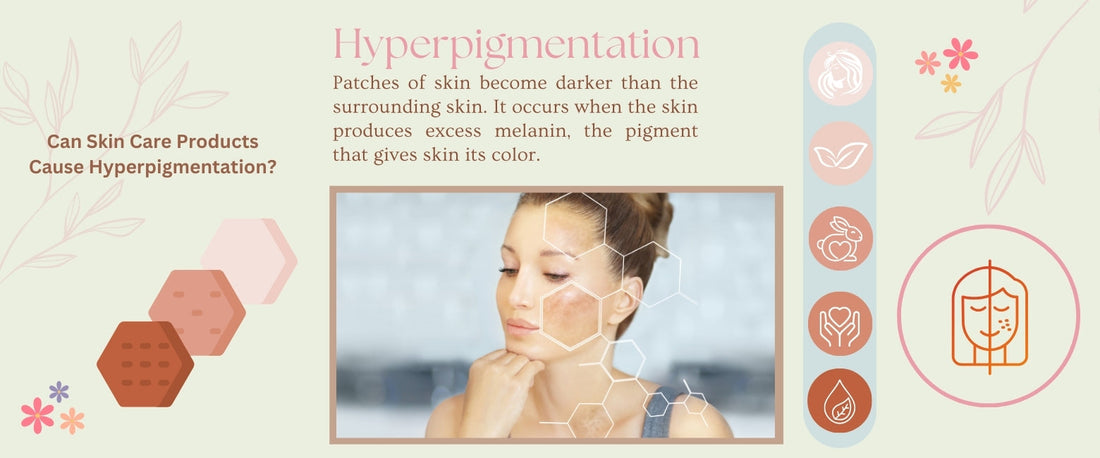Debunking the Myth:
When it comes to achieving a radiant and even skin tone, hyperpigmentation can be a frustrating concern. As you explore various skincare options, you may wonder if the very products you're using to improve your skin could actually be causing or worsening hyperpigmentation. In this blog post, we'll dive into the question of whether skin care products can cause hyperpigmentation and provide insights to help you make informed decisions, especially if you prefer all-natural skin care solutions.
Understanding Hyperpigmentation
Hyperpigmentation refers to the darkening of certain areas of the skin, resulting from an excess production of melanin, the pigment responsible for giving color to our skin, hair, and eyes. Common forms of hyperpigmentation include sunspots, melasma, and post-inflammatory hyperpigmentation (PIH) caused by acne, cuts, or other skin traumas.
The Role of Skin Care Products
While it's true that certain skin care products can exacerbate existing hyperpigmentation or cause skin irritations, it's important to distinguish between products that potentially contribute to the problem and those that help address it. The key lies in understanding the ingredients and formulation of the products you use.
Avoiding Harsh Ingredients
For those individuals who prefer all-natural skin care products, means that many of these products can help combat hyperpigmentation without causing further damage. These products that are free from harsh chemicals, artificial fragrances, and potentially irritating substances, you can minimize the risk of aggravating existing pigmentation issues. Harsh ingredients like parabens, sulfates, and synthetic fragrances can disrupt the skin's natural balance and potentially trigger inflammation that worsens hyperpigmentation. Instead, focus on products that contain plant-based extracts, natural oils, and gentle formulations.
What Skin Care Ingredients to Avoid
Some ingredients commonly found in skin care products have the potential to cause or worsen hyperpigmentation in some individuals. It’s important to note that these ingredients may not affect everyone in the same way and their impact can vary based on individual skin sensitivities and reactions. Here are some common skin care product ingredients that could potentially contribute to hyperpigmentation:
- Hydroquinone: Hydroquinone is a commonly used skin-lightening ingredient in many hyperpigmentation treatments. However, prolonged and excessive use of hydroquinone can cause a condition called exogenous ochronosis, characterized by the darkening and thickening of the skin.
- Fragrances: Synthetic fragrances found in some skincare products can be irritating to the skin, leading to inflammation and potentially triggering hyperpigmentation in susceptible individuals. It's advisable to opt for fragrance-free or naturally scented products if you have hyperpigmentation concerns.
- Alpha-hydroxy acids (AHAs): AHAs, such as glycolic acid and lactic acid, are commonly used in exfoliating and resurfacing products. While they can be beneficial for promoting cellular turnover and reducing hyperpigmentation, excessive or improper use of AHAs can cause skin irritation and potentially worsen pigmentation issues. It's important to follow product instructions and consult with a skincare professional to determine the appropriate concentration and frequency of use.
- Retinoids: Retinoids, including retinol and prescription-strength retinoids like tretinoin, are renowned for their anti-aging and skin-renewing properties. However, in some individuals, retinoids can cause skin irritation, redness, and even trigger post-inflammatory hyperpigmentation, especially when used in high concentrations or without proper sunscreen protection.
- Harsh Exfoliants: Abrasive physical exfoliants, such as harsh scrubs or brushes, can cause micro-tears in the skin, leading to inflammation and potential hyperpigmentation. It's advisable to choose gentler exfoliation methods, like chemical exfoliants or enzymatic peels, to promote cellular turnover without causing unnecessary trauma to the skin.
- Certain Preservatives: Some preservatives, such as parabens and formaldehyde-releasing preservatives like DMDM hydantoin or diazolidinyl urea, have been associated with skin sensitivities and allergic reactions that can lead to hyperpigmentation in susceptible individuals. Opting for products with alternative preservative systems or preservative-free formulations may be beneficial for those with hyperpigmentation concerns.
Look for Ingredients that Promote Brightening
When choosing all-natural skin care products to address hyperpigmentation, keep an eye out for ingredients known for their brightening properties. Vitamin C, a powerful antioxidant, helps inhibit melanin production and fade dark spots over time. It also promotes collagen synthesis, improving skin texture and overall radiance. Other natural brightening ingredients to consider include licorice extract, which has been shown to inhibit tyrosinase activity, and kojic acid, derived from mushrooms, which can help lighten dark spots and even out skin tone. Niacinamide, a form of vitamin B3, is another beneficial ingredient that can reduce hyperpigmentation and boost skin hydration.
EE’s Vitamin C – Facial Serum is carefully crafted with a blend of all natural ingredients to enhance your skin’s health and radiance; packing 18% naturally derived Vitamin C, which can help brighten, protect and rejuvenate your skin. To learn more about the other natural essentials in our Vitamin C – Serum, click here.
Gentle Exfoliation for Enhanced Results
Exfoliation is another important aspect of a hyperpigmentation-fighting skin care routine. By removing dead skin cells, you encourage cellular turnover and allow brightening ingredients to penetrate deeper into the skin. However, it's crucial to choose gentle exfoliants that don't cause excessive irritation. Natural exfoliating ingredients like fruit enzymes, derived from papaya or pineapple, offer a mild and effective way to slough off dead skin cells. These natural enzymes gently dissolve the bonds between dead skin cells, revealing a fresher and more luminous complexion.
Oh My Papaya Facial Exfoliating Cleanser by EE is a lotion based facial exfoliant with tiny jojoba wax ester beads that gently exfoliate without leaving micro-lacerations on the skin.
Are you ready to take the first step towards brighter, more even-toned skin? Explore our range of all-natural skincare products and start your journey towards a more confident and radiant you.

